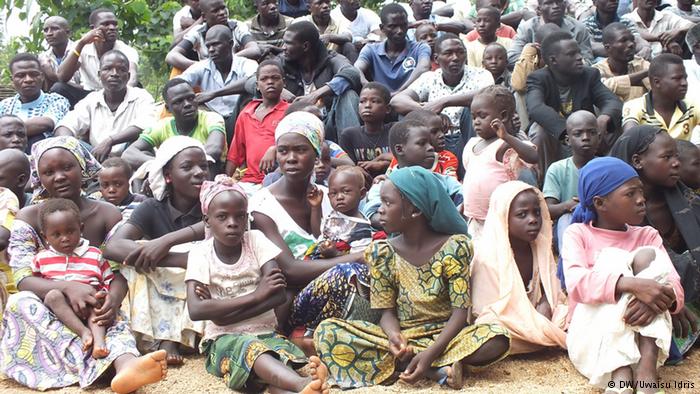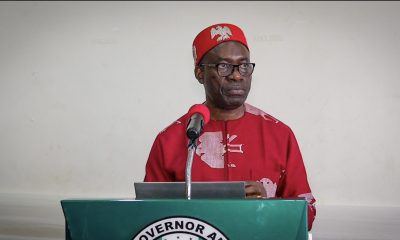News
North east refugee crisis: Global concern for IDPs heightens
Published
9 years agoon
By
Olu Emmanuel
•0.48m children suffering acute malnutrition
• FG says report of starvation exaggerated
• 21m people resident in troubled zone
By SEGUN ODUNEWU, with Agency Reports
THE international community has continued to express concerns over the plight of Internally Displaced Persons (IDPs) in the troubled North East of Nigeria. Representatives of foreign multilateral institutions and civil society organisations decry the increasing deficit of humanitarian services available to the over 2.6 million victims of the Boko Haram terrorists’ invasion and wanton killings in local communities in Borno, Yobe, Adamawa states and neighbouring countries including Chad, Cameroun and Niger. The most strident warning called on all concerned to act promptly to stop as many as a million displace persons dying of hunger.
The Federal Government through the Presidency has dismissed different agencies’ reports of starvation or its imminence in North-East, assuring the world that it has been and remains committed to the welfare of the besieged people of the region.
Malam Garba Shehu, the Senior Special Assistant on Media and Publicity to the President, said the Federal Government was concerned about these blatant attempts to whip up a nonexistent fear of mass starvation by the aid agencies, a type of hype that does not provide solution to the situation on the ground “but more to do with calculations for operations financing locally and abroad”. He noted that the affected states with active collaboration with NEMA and the recently inaugurated Presidential Committee on North-East Initiative (PCNI), were deeply involved in efforts to cushion the humanitarian challenges, especially of food security and nutrition.
Recent stock-taking on the cost of lives in the seven years of Boko Haram terrorism, however, revealed that over 21 million people are resident in the areas worst affected by the terrorists’ attacks in the West African sub-region. Of the 21 million people, 15 million are Nigerians. The statistics also shows that 2.6 million people are displaced, among whom 1.95 million are Nigerians. Of the 9.2 million people in need of general services, Nigeria accounts for seven million; 478,300 children are suffering acute malnutrition, among whom 397,400 are Nigerians; 6.4 million are suffering from food insecurity at crisis and emergency levels, with Nigerians constituting an alarming 4.4 million from this population.
The United Nations (UN) has declared that about $739 million is required to assist the estimated six million affected people. The international organization, swung into action last week to launch $1 billion appeal fund to support IDPs in Nigeria as it worried about reports of monumental corruption perpetrated by government officials involved in the distribution of relief materials and humanitarian supplies provided by government, philanthropists, civil societies, local and international.
Apart from rampant reports of callous diversion of humanitarian materials, essentially, food stuff and clothing by those assigned on that duty by government there have also been cases of rape and forced marriages in the IDPs camps.
The UN had penultimate week, called for immediate action to provide succour for the IDPs who, unfortunately have to face the mundane problem of keeping body and soul together after surviving the horrors unleashed by the murderous terrorists hiding under the banner of religion. The organization warned that the perennial unrest and rising inflation is disproportionately affecting the displace persons who may suffer untold hardship and disease if not provided with adequate assistance, sense of safety and the hope of return to normal life in the near future. Thus, the United Nations agriculture agency proceeded to appealed for $25 million through May 2017 to support irrigated vegetable production and micro-gardening in the dry season, as well as rebuild livestock systems in the north.
The Food and Agriculture Organization (FAO) said the urgently needed funds would tackle food insecurity among returnees, internally displaced and host communities. In addition, the agency is seeking funds now to provide critical agricultural inputs to farmers in time for the 2017 main rainy season.
“We must act now to rapidly restore food security and combat severe hunger and malnutrition,” FAO said in the update, which notes that inflationary pressures in the national economy have pushed the prices of staple food crops extremely high across the three northeastern states of Adamawa, Borno and Yobe; and these are expected to rise further, requiring “immediate intervention.”
In other news, the International Organization for Migration (IOM) had in its report indicated that since August 2015, a total of 958 549 returnees from within and outside Nigeria have been recorded, with an increase of about 48 000 returnees since August 2016. The IOM stated that “this further emphasizes the need for increased attention towards sustainable agricultural livelihoods support to the returnee process.”
Although the Federal Government has continued to mobilize the armed forces to rout the insurgents, international organisations and news media with access to the area report that security remains volatile in the north east, particularly, in Borno State, as Boko Haram activities continue to impact the security situation in some areas. In Borno, Yobe and Adamawa States, nine local government areas (LGAs) were categorized as ‘restricted’ and 27 LGAs categorized as having ‘limited’ access due to a high level of insurgent activity.
Degraded and badly crippled as Boko Haram may be the sect members still manages to launch devastating suicide-bomber attacks that rattle Nigerian authorities. According to a top military commander mourning the death of a valued colleague and soldiers in one such opportunistic ambush, the monster is wounded yet liquidated. Hence the 2017 Humanitarian Response Plan for Nigeria seeks more than US$1 billion to assist those in crisis in the most affected states.
The UN Office for the Coordination of Humanitarian Affairs (OCHA), observed that throughout 2016, human suffering has become more apparent as the Nigerian Armed Forces pushed Boko Haram out of areas the group had held. It noted that the response area shifted from Abuja to Borno State, enabling easier access to the vulnerable population for the humanitarian teams; adding that, “however, the conflict scaled up and so did the urgent need for more assistance.”
“This is the largest crisis on the African continent and I am confident that with the support of the international community and the private sector, we can begin to bring hope to the people of the north-east,” Peter Lundberg, Deputy Humanitarian Coordinator, had declared.
He extended compliments to the federal government and the rationale behind the Inter-Ministerial Task Force on their full cooperation to address the humanitarian crisis in the country.
It was acknowledged that while fear of unexploded improvised devices prevents farmers from planting for a third year in a row, nearly 5.1 million people are expected to face serious food shortages. Thus, the Humanitarian Response Plan will aim to tackle urgent nutrition, food, shelter, health, protection, education, and water and sanitation needs.
“The narrative on this humanitarian crisis can no longer be ignored and we are appealing to the international community to help us prevent the deaths of thousands of innocent civilians over the coming 12 months,” Lundberg stated.
Deeply troubled, the government has already demonstrated and will continue to demonstrate strong commitment to working together with the international humanitarian community. Zainab Ahmed, Minister of State, Ministry of Budget and National Planning of Nigeria, says President Buhari has put everyone on notice that he would stop at nothing to return the affected region to normality.
The United Nations Children’s Fund (UNICEF) had earlier revised its humanitarian appeal for Nigeria from $55 million to $115 million in order to be able to assist an additional 750,000 people who can now be reached across conflict-affected areas in the north-east.
Afshan Khan, UNICEF’s Director of Emergency Programmes had lamented that, “Children’s lives are literally hanging by a thread;” adding,“We are reaching new areas to provide critical humanitarian assistance but we need greater international support to further scale up and reach all children in dire need.”
UNICEF emphasized that as new areas open up to humanitarian assistance, the true scale of the Boko Haram-related crisis and its impact on children is being revealed.
UNICEF decried that an estimated 400,000 children under five will suffer from severe acute malnutrition in three states across the north-east this year. It noted that more than four million people are facing severe food shortages and 65,000 people are living in famine-like conditions, mostly in Borno, the worst affected state.
UNICEF also revealed that the destruction of whole towns and villages further complicates the response in north-east. Some 60 per cent of health clinics have been partially or completely destroyed, and 75 per cent of water and sanitation facilities require rehabilitation in Borno State, it highlighted.
Further statistics shows that nearly one million children are now displaced across the north-east, a million are out of school and hundreds of thousands are psychologically affected from the horrors they have lived through.
UNICEF’s funding appeal comes as a series of coordinated emergency polio immunization and nutrition campaigns in north-east Nigeria and neighbouring countries is under way, targeting 1.8 million children in Borno State alone. The immunization campaign is also identifying and treating children with severe malnutrition.
The agency has increased its response in the areas most affected by the Boko Haram conflict since April, supporting basic health care and nutrition for children and mothers, and helping provide safe water and sanitation, child protection services and learning opportunities.
Since the beginning of 2016, 2.6 million conflicted-affected people have been given access to UNICEF-supported preventive health-care services and nearly 75,000 children have been treated for severe acute malnutrition in north-east Nigeria.
The construction and rehabilitation of boreholes has provided nearly half a million people with improved access to safe water. Safe learning spaces, teacher training and educational supplies have helped more than 72,000 children restart their education, and some 133,000 children have been provided with psychosocial support, UNICEF said.
It was indicated that only $28 million of the $115 million humanitarian appeal has been received, which, the agency said, presents a “serious obstacle” to its scale-up plan.
For Nigeria, there is no denying or diminishing the negative impact of Boko Haram terrorists on the socio-economic well-being of the country. After all, President Muhamadu Buhari came into office vowing to crush the group and restore security in the beleaguered north east. So far, even the international community agree that a lot has been achieved in the war against the terrorists. A couple of months ago the government successfully negotiated the release of some 20 girls, ostensibly among the 200-plus girls abducted by the terrorists over two years ago, sparking international outcry and sympathy for the poor people of north east Nigeria.
Today, the worry is no longer that Boko Haram is yet to be decisively neutralized. The battle is for the return of peace and security to the region; a return to the rustic but peaceful life that enabled the people of North East Nigeria to be known as part of the great bread basket of the country and Nigeria as a promising emerging economy on the African continent.
It was indicated that only $28 million of the $115 million humanitarian appeal has been received, which, the agency said, presents a “serious obstacle” to its scale-up plan.
Trending

 Comments and Issues1 week ago
Comments and Issues1 week agoIfunanya died in the capital city—what hope is there for rural Nigerians?

 Comments and Issues1 week ago
Comments and Issues1 week agoThe politics and optics of electronic transmission of election results

 Comments and Issues1 week ago
Comments and Issues1 week agoCombating Political Apathy in Nigeria, Reigniting the Nation’s Democratic Spirit

 Health6 days ago
Health6 days agoDOJ files expose Gates–Epstein ties in pre-COVID pandemic planning, funding

 Comments and Issues1 week ago
Comments and Issues1 week agoSenate’s coup against Nigeria’s democracy

 Education1 week ago
Education1 week agoSit-at-Home: Anambra suspends nine headteachers over pupils’ low attendance

 Football6 days ago
Football6 days agoPremier League defends Leeds goal after Chelsea draw controversy

 Aviation7 days ago
Aviation7 days agoAeroland Travels losses US$333,350.53 to Lufthansa Airlines petitions IGP, Interpol

